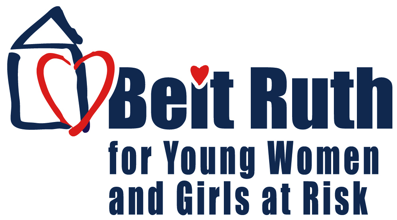Beit Ruth - Breaking the Cycle of Violence
June 2017, by Ronit Lev-Ari, Beit Ruth Project Manager
November 25 is the International Day for the Elimination of Violence Against Women. The United Nations, and all those who recognize this day’s importance, acknowledge that violence against women is a human rights violation; it is a consequence of discrimination against women; it impacts and deters from progress in many areas involving equality, peace and security; it is preventable and essential. And yet, violence against women is still a worldwide pandemic.
Beit Ruth’s Program Manager, Ronit Lev-Ari is a leading expert in women’s issues and juvenile transgression in Israel. While in graduate school for Criminology between 1976 to 1979, Ronit conducted the country’s first exploration on violence against women. The study was based on the research of American psychologist, Dr. Richard Gelles. The results of her research directly influenced change in law enforcement policy, welfare and police jurisdiction.
Below, and in honor of the International Day for the Elimination of Violence Against Women, Ronit discusses the tragically significant role that violence against women plays in the lives of the girls of the Beit Ruth Village.
The Beit Ruth Village – from a life of victimhood, violence and dependency – to a life with freedom of choice and independence.
Beit Ruth was established at the end of 2005 as a hostel in Rishon Letzion. A safe-haven for Israel’s at-risk, abused and abandoned girls. From that, a Youth Village for at-risk teen girls was born, opening its doors in the north Israel town of Afula where it’s been successfully running for the past three years.
Beit Ruth’s overall goal is to help every at-risk and vulnerable girl heal, be nurtured and grow -- re-entering mainstream society after she turns eighteen as a responsible, self-sufficient and able young women. In Israel, that means having the opportunity to serve in the Israeli Defense Force (which is mandatory for most Israeli citizens), join the National Service, be gainfully employed, continue her education and/or begin to build a new family all her own. In most cases our girls arrive at Beit Ruth between the ages of 13—18 years old after they have been removed from their homes by court order. Some girls come directly from their respective communities, from the streets - and others from short term government-run treatment centers and others from lockdown psychiatric facilities.
In most cases, regardless of how they came to us or from what part of Israel, they share a common family history: more than 90% of our girls have reported witnessing violence towards their mothers and being victims themselves of physical, sexual and severe emotional abuse.
Some of these girls, at various points throughout their young lives, found themselves living with their mothers in shelters for battered women. Many of them have seen their fathers imprisoned for domestic violence towards their mothers. In some of the most extreme cases, the father is serving a life sentence because he was found guilty of sexually abusing his daughter— our resident— and her siblings.
The phenomenon of domestic violence against women and children is a critical issue when discussing the topic of family and childhood at Beit Ruth. But addressing it is especially critical as our girls begin to consider their future and pursue romantic relationships and motherhood themselves.
One central and distinctive factor in these girls’ upbringing is the dysfunction in which they were raised – the lack of a consistent and appropriate mother or nurturing and protective “mother figure.” This type of mother, who might herself have been “at risk” and still behaves like a “teen girl” is unable to meet her family’s basic emotional needs. In some cases, this “teen girl” may even reject her own daughter, blaming her for her current situation.
One of Beit Ruth’s central goals is to nurture and restore our girls’ trust and confidence in themselves and in those who care about them, who want to support and help them. Beit Ruth is holistic in its treatment. It is founded on the teamwork and collaboration of an all-female staff, on emotional connections, on combined tools for independence, both at the level of individual self-esteem and consequently in larger settings like their education.
Our girls learn and live within the safe haven of Beit Ruth, where each girl has an individualized treatment and academic plan tailored to meet her needs. The Beit Ruth team of educators stays connected with the girls’ respective families as well as other relevant members of their community.
The Beit Ruth family of educators also stay in touch with our alumni, who continue to turn to our staff for support and love long after they’ve graduated from the Village. We are proud that Beit Ruth continues to be a source of this type of connection, and something our girls can consider a true home even after they’ve left to rejoin society and build their own future.
Beit Ruth is not simply a place where Israel’s at-risk, abused and vulnerable girls sleep or study or live. It is not a residence or a school. Beit Ruth is home, it is family and it is love. This concept of “home” is critical. Not just for our girls, but for every child everywhere. One’s home - where we come from - where we are nurtured, cared for and loved unconditionally - becomes a guidepost for making the “right” choices in life for ourselves, towards others and for establishing respectful, healthy and loving relationships. In the case of the girls who live in the Beit Ruth Village and call Beit Ruth home, it can be what finally breaks the cycle of violence and abuse they witnessed and experienced in their all-too young lives, and took place for many generations before. Beit Ruth is a place of new beginnings.

